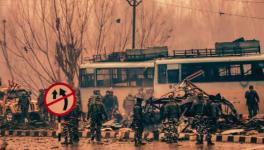Without Economic Content, Democracy Becomes Tool of Ruling Class

Image Courtesy: Picpedia
Agha Shahid Ali’s brilliant poem, The Country Without a Post Office, transcends and universalises the plight of humanity under oppression. No matter how successfully it is concealed, oppression, to paraphrase Adorno, has force as its essential nature. Ali, an internationally acclaimed poet, writes, “I am being rowed through Paradise on a river of Hell.” His words are an agonising expression of the plight of Kashmir and its people. Ironically, they cannot be said to describe Pakistan because instead of rowing through paradise—a possibility shelved from the beginning—its people have been shoved straight into an economic inferno by the ruling class.
The dilemma of the modern lexicon is its tendency to thrive on inherently contradictory fancy jargon. “Whoever is versed in the jargon,” Adorno says, “Does not have to say what he thinks, does not have to think properly. The jargon takes over the task.” This is precisely what the economic jargon of capitalist economists does with words and phrases like austerity, economic rationality, and trickle-down effect. They convey to the masses a cluster of contradictory elusive messages designed to masquerade their anti-people ideology. Apparently, they express the noble intention of reviving the economy to benefit the people, but in reality, they are innately hostile to the interests of the masses.
In a similar vein, the concepts of friends, protectors, and foes find themselves standing on their heads. Shrouded in the mist of jargon, they have become not what they are but their opposites. Hegel was quick to apprehend the irrationality of this reality, stating, “That which is immediately presented to us cannot be true.” The modern capitalist state has become one petrified embodiment of Hegelian untruth. No matter which country it rules, it lies persistently and blatantly, with little shame and no guilt. It kills humanity in the name of securing humanity from humankind. Its DNA can be found everywhere, from Iraq to Ukraine and Palestine to Baluchistan to Kashmir, where dissidents are disappeared in the shadows of the night, never to reappear again.
In recent times, the intolerant Pakistani establishment has been taking Punjab, a mainly conformist province, in its iron-fisted clutches. Any dissension is sedition. Punjab was the first province to embark on the journey of advanced capitalism. Despite massive inequality and unemployment, an integral part of capitalism—which inherently needs an army of unemployed workers to push wages down, chooses the young and active workers to realise capital, and cleaves workers through competition—the people of Punjab not only endured the “repressive tolerance” but long identified themselves with the oppressors—the civilian-military dictatorship that became their nemesis.
Capital accumulation, nevertheless, has its own dynamics. Whereas it exploits the natural resources of other backward provinces—especially Baluchistan, kept in sheer poverty by design—it compounds its surplus value in advanced urban areas by wage-slashing, reducing the number of workers by introducing new technologies, and enhancing inflation. When the civilian bourgeoisie is weak and unproductive and thrives on the backing of the state, it fails to secure its electoral constituency. For example, Punjab, for its incapability to provide relief to its voters in crunch times. Hence, it loses legitimacy and yields meekly to arms-carrying gladiators. The history of India for Marx is the history of invaders, and the history of the Pakistani civilian ruling class is the history of disgraceful subjugation to so-called apolitical intruders.
The gloomy political picture similarly reflects the lack of self-reliance of the military bourgeoisie of Pakistan, whose military-industrial complex, unlike many other armies of the world, is incapable of accumulating enough capital by selling its military products to foreign countries in sufficient quantities. Hence, it uses national security as a ploy to grab the biggest chunk of the cake. Once the United States’ interest in Afghanistan dwindled, and most countries of West Asia recognised Israel and are beginning to negotiate with each other, the role of the Pakistan Army as the protector of the sheikdoms has largely diminished.
After losing American backing, the rentier nature of the Pakistani state stands completely exposed to the public. The Army’s confession of no further participation in political affairs assured the people of its permanent indulgence in politics in the future as well. It is impossible for those controlling the means of production to avoid the temptation of staying away from politics, for politics is economics.
In the process of running the country with the snapping of their fingers, the Praetorian Guard has turned Pakistan into a destructive laboratory that produces nothing but poverty, penury, and a mass of orthodox, illiterate, religious fundamentalists. From the womb of peripheral capitalism and a rentier economy, a failed and bankrupted state has been born, which neither belongs to the present nor the future.
In the current circumstances, the demon of economic default is staring into our eyes. Some bourgeois economists advocate restructuring the loans and asking the ruling elite to seek bailouts, relying upon the benevolence of international financial institutions. They are fully aware of the predatory nature of these institutions but, being part of the neo-liberal (dis)order, cannot see any other remedy to the economic problems of Pakistan.
These financial institutions are controlled by the United States. Donald Trump-era Argentina is a case in point. When the right-wing president Mauricio Macri was about to contest for his second term, the Trump administration forced the International Monetary Fund to give Argentina a historically unprecedented $57 billion loan to enhance his chances of victory. It should have been a great scandal for the IMF to be privy to Argentina being in no position to repay debt. The money, like always, lined the pockets of the big capitalists and found its way into their offshore accounts: A vivid deviation from the dictates of the IMF, which prohibits the flight of borrowed capital.
Macri, involved in many monetary scandals, including the Panama one, lost the election and his successor, Alberto Fernandez, refused to take the remaining $10 billion chunk.
Pakistan faces a situation akin to Argentina, where no amount of money can bail out the beleaguered state unless there are radical reforms. To counter the unproductive investment, the housing mafia and the traders must be taxed heavily, while the defence budget needs to be slashed. The import of all items barring essential commodities needs to be strictly stopped. The avenues of alternative clean energy must be sought, and, least of all, a committee of highly skilled and fully empowered economists should be formed to take decisions binding on the state.
Pakistan’s “low-intensity democracy”—a term coined by Samir Amin—is not working. “Elections”, Marxist scholar Aijaz Ahmed said, “Is one of the organised crimes of capital against humanity”. For, as Herbert Marcuse said, “Elections of masters do not change master-slave relations”. Instead, they complement this relation. For the countries of the Global South held hostage to metropolitan capital and its vulture comprador bourgeoisie, Chinese “enlightened despotism” is far superior to “enlightened moderation”. The latter is enforced upon the people of Pakistan by the spineless ruling class, with a tag of a sham democracy manipulated according to the interests and dictates of the Praetorian Guard.
Democracy devoid of economic content is a tool in the hands of the ruling class to trade people’s consciousness with conformity. For the same reason, Rosa Luxemburg said, “There is no democracy without socialism, and there is no socialism without democracy,” albeit neither is in sight.
The writer is an Australia-based academic and has authored books on socialism and history.
Get the latest reports & analysis with people's perspective on Protests, movements & deep analytical videos, discussions of the current affairs in your Telegram app. Subscribe to NewsClick's Telegram channel & get Real-Time updates on stories, as they get published on our website.
























